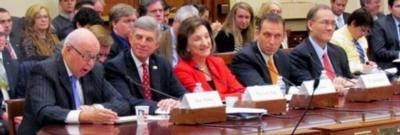Hearing Before The House Science, Space, And Technology Committee
The House Science, Space, and Technology Committee held a hearing Wednesday with a panel of distinguished experts to hear their perspectives on NASA’s strategic vision and the future of America’s space program. “We are in a very challenging budget environment that will be with us for the next several years,” said Committee Chairman Ralph Hall (R-TX). “Fiscal realities demand that NASA become more efficient and sized correctly to accomplish its goals, but consensus will have to be re-established among the agency’s stakeholders to clarify NASA’s strategic vision, goals, and missions.”

The recently released National Research Council (NRC) report, NASA’s Strategic Direction and the Need for a National Consensus, was discussed by the Vice Chair of the report, Maj. Gen. Ronald Sega, USAF (Ret). Gen. Sega said that the committee “heard about the frustration of many staff with [NASA’s] current path and the limitations imposed upon it by the inability of the national leadership to agree upon a long-term direction for the agency.” Gen. Sega said, “Only with a national consensus on the agency’s future strategic direction, along the lines described in this report, can NASA continue to deliver the wonder, the knowledge, the national security, and economic benefits, and the technology that has typified its history.”
“NASA’s basic role must be to do projects that push the envelope of what we know," said The Honorable Robert Walker, Executive Chairman of Wexler & Walker, and former chairman of the House Science Committee. "High risk will lead to new technologies. That combination of risk and reward will underpin the next generation of space knowledge and products.”
Walker said that “the reality is that no Federal budget in the foreseeable future is going to provide NASA with the money it needs to do everything we want it to do.” In order to fill this funding gap, Walker said “NASA must see entrepreneurship and enablement as key components of its science, technology and exploration programs. NASA can extend its reach and find new financial resources by opening its doors wide to collaborative programs that allow any and all American space entrepreneurs, willing to pay for it, access to NASA expertise.”
The Honorable Marion Blakey, President & CEO of the Aerospace Industries Association, encouraged NASA to invest in the goals represented in the bipartisan NASA Authorization Act of 2010. “The resurgence in new human spaceflight system development is incredibly impressive: no other nation in the world is developing such a wide breadth of systems in the public and private sector,” Blakey said. “By building upon these successes with continued investment and policy support for the goals in the 2010 Act, the U.S. government can be assured its space program will remain worthy of a great nation.”

Professor for Space Science at University of Michigan, Dr. Thomas Zurbuchen, urged NASA to build toward ambitious goals by ensuring we have the experienced workforce and technology that will be necessary. “We are in a period of limited resources, and so progress will be inevitably limited. This is an ideal time to position ourselves for better times,” Dr. Zurbuchen said. “The way to do this is to ensure that a talented work force will be available, and that innovations and technology are pursued, so that when we come out of this period of limited resources we are positioned to advance rapidly.”
Dr. Scott Pace, Ph.D, Director of the Space Policy Institute at The George Washington University, said that “Our Nation’s space program needs clear, decisive, and steadfast leadership. We have enjoyed a half-century of leadership in space, but now that leadership is eroding despite the hard work of our industry and government personnel. Yes, more money would be useful, but steadiness of purpose, coherence, and bipartisan support are even more important.” Dr. Pace also stressed the need “to make a more explicit recognition of the need for international partners in a long-range vision of human space exploration.”
(Image from Committee website)
 ANN's Daily Aero-Linx (04.13.24)
ANN's Daily Aero-Linx (04.13.24) ANN's Daily Aero-Term (04.13.24): Beyond Visual Line Of Sight (BVLOS)
ANN's Daily Aero-Term (04.13.24): Beyond Visual Line Of Sight (BVLOS) Airborne 04.09.24: SnF24!, Piper-DeltaHawk!, Fisher Update, Junkers
Airborne 04.09.24: SnF24!, Piper-DeltaHawk!, Fisher Update, Junkers Aero-News: Quote of the Day (04.14.24)
Aero-News: Quote of the Day (04.14.24) ANN's Daily Aero-Term (04.14.24): Maximum Authorized Altitude
ANN's Daily Aero-Term (04.14.24): Maximum Authorized Altitude




